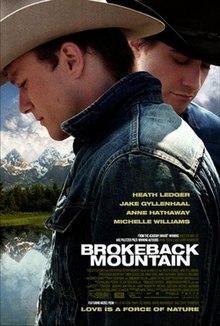Week 10
Brokeback Mountain (2005)
Genre: Western-romantic-drama

Ang Lee’s Brokeback Mountain still remains an absolutely groundbreaking film, not just for its fantastic story and detailed visuals, but how it introduced LGBTQ+ themes into mainstream cinema. Before Brokeback, gay themes were scarce, even shunned in Hollywood, but Lee’s film, propelled by A-listers Heath Ledger and Jake Gyllenhaal found extreme box office and critical success amid conservative controversy. It even garnered a Best Picture nod at the 2006 Oscars, though it infamously lost to Crash, most probably due to Brokeback Mountain‘s expression of often explicit gay love. The film portrays a pair of 1960s cowboys, Jack Twist and Ennis Del Mar (portrayed by Jake Gyllenhaal and Heath Ledger, respectively), as they begin a taboo relationship while working a summer job herding sheep together. The characters themselves are truly refreshing, and their characterization completely avoids gay stereotypes which were common in early 2000s’ media. Both Jack and Ennis are “manly” men, working to the bone in western garb to return a small profit. The men begin a rocky relationship throughout the years, behind the backs of their families. At home, both Ennis and Jack are the quintessential American Western fathers, with their wives taking care of the kids whilst the both make a living while continuing to go out of their way to meet up with each other. Jack and Ennis’ get-togethers consist of “hunting trips,” on Brokeback Mountain, where the two first met and made love. What Ennis and Jack share is soft and tender, contrasting with their rougher personalities. The love Jack and Ennis have for their wives is much different, being difficult and filled with obligations, yet when Ennis and Jack are together, those obligations melt away, however, they are still held by society’s tight grip, and thus are ashamed of their relationship. Even when their marriages fall apart, Ennis refuses Jack’s offer for the two to live together, afraid to completely lose his children and be subject to the strict judgement of the 1970s. After Ennis’ refusal, the two go on one final trip together, wherein Ennis and Jack fight, and the pair then lose contact with one another as a result. Months later, tragedy strikes and Ennis is left feeling emptier than ever, but is invited by Jack’s mother, now aware of the true nature of Ennis and Jack’s relationship, to take Jack’s shirt that he wore in Ennis and his last fight. Years later, it’s shown that Ennis still hangs onto Jack’s shirt like a prized possession, and that Ennis pins all of the postcards he received from Jack onto his wall, showing that his love for Jack has not waned. Brokeback Mountain is revolutionary in the way it portrayed gay love as tender, and this love-against-all-odds story can even touch the most bitter of homophobes. Before the movie’s release, many of the advertisements would portray Ennis and Jack’s relationship with their wives, tricking the audience into believing that what they were seeing was another heterosexual romantic period drama, yet Brokeback Mountain goes so much beyond that by also focusing on the struggles that LGBTQ+ people face and how normalized homophobia has become. Overall, this film is fantastic and though I shed major tears during it, it’s definitely something special and a must-watch for everyone.
I had obviously heard of this movie beforehand, but I never watched it– seems like I should definitely check it out! I feel like this is one of the movies that people gravitate to when looking for LGBT classic films. I’ve definitely heard varying reviews for it, but it seems great!
Oh MAN brokeback mountain. I forget every single time that Jake Gyllenhaal is in this movie until I see him. Suprisingly enough, I’ve never actually seen this one but I know I need to make time to do so. It’s several of my friends’ favorite movie. I think that it’s very interesting how the ads focused on the relationships with the wives and then basically pulled a (good) 180 with the contents of the movie. I think that the portrayal of gay love as something tender and wholesome is definitely needed within the community.
The way the pair are separated makes the message of the movie more poignant for me. I think that bond that can endure after being pushed apart by so many forces is definitely a strong one, for better or for worse.